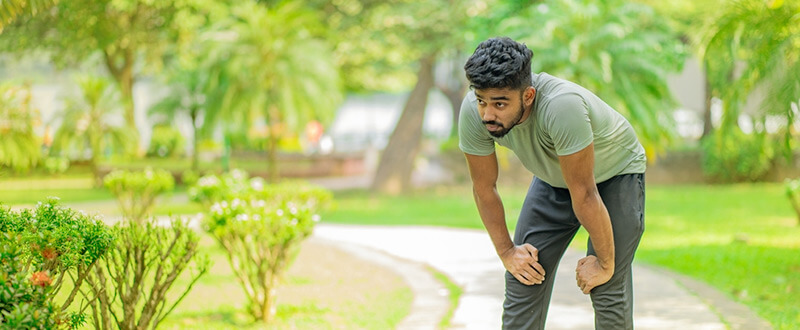
Understanding the Impact of Summer on Blood Pressure & Heart

Table of Contents
Weather and climate changes affect our health more than we realise. Medical research has established that thermal environmental factors like humidity, air, radiant temperature, and air movement impact our body’s response by shedding extra heat, which strains the heart.
How do Weather and Humidity Affect Blood Pressure?
In susceptible patients, high temperatures increase symptoms of heatstroke and heart attacks due to increased blood viscosity (resistance to blood circulation). Heat is known to cause cardiovascular risks due to sweating, dehydration, and high surface blood circulation that may induce chances of heart failure and stroke.
Several medical studies have also proven that outdoor temperatures significantly determine seasonal fluctuations in blood pressure causing high blood pressure and low blood pressure in winter and summer, respectively.
Does Hot Weather raise Blood Pressure?
Prolonged exposure to summer heat can cause heat exhaustion, heat cramps, symptoms of heatstroke, extreme sweating. It can also lead to increased blood viscosity, cardiac workload, haemoconcentration (increase in red blood cells), risk of thrombosis (clotting of the blood), and a weakened or quickened pulse rate.
Why Does Hot Weather Raise Your Blood Pressure?
Several factors cause heat-related stress, some of which are –
-
Dehydration
Our body cools itself by sweating to keep the body temperature regular (around 37°C). It is usually is 70 to 80% of our body’s heat loss. However, if a person becomes dehydrated due to extreme heat, they don’t sweat much, causing their body temperature to rise.
-
Extreme Sun Exposure
Under high temperatures, our body circulates twice as much blood per minute. It requires the heart to beat harder and faster. Humidity and sweating also cause fluid loss that reduces blood volume.
-
Lack of Fresh Air
Poorly ventilated rooms or crowded and hot areas may cause heat-related dizziness or fainting due to reduced blood flow to the brain.
Warning Signs of Heat and Humidity-Related High Blood Pressure
- Rapid pulse
- Extreme sweating or inability to sweat
- Spasms or muscle cramps
- Severe swelling of ankles or feet
- Cold, damp skin
- Disorientation or confusion
- Dizziness
- Nausea
- Fatigue
- Headache
When Must You See A Doctor?
Heat and humidity during summer can be dangerous to people of all ages. However, certain factors make some adults more vulnerable to hot weather and blood pressure, especially if they
- are above 50 years of age
- have heart, lung, or kidney problems
- follow a low-sodium/salt diet
- have cardiovascular or other circulatory diseases
- take medicines for blood pressure, sedatives, or other diuretics
Tips to Manage Hypertension During The Summer
With these few steps, you can avoid hot weather and blood pressure, and other humidity-related medical crises:
-
Stay hydrated
Drink plenty of water and consume foods with high water content, such as watermelon, cucumber, muskmelon, berries, tomatoes, and leafy greens. Apart from having essential vitamins to keep high blood pressure at bay, these superfoods also have rich antioxidant properties. You can also include yoghurt, banana, and coconut water in your daily diet to stay hydrated and manage high blood pressure.
-
Avoid mid-day sun heat
The sun is at its peak at mid-day, i.e., between noon and 4:00 p.m. If you stay outdoors when the sun is at its hottest, your blood pressure decreases because of sweating and fluid loss. To avoid humidity, hot weather, and blood pressure problems, try staying indoors and schedule your outings like chores and other errands during the early morning hours or after sunset. If you must spend a lot of time outdoors during morning and afternoon hours, make sure you protect yourself from the sun by wearing a hat, sunglasses, and lightweight clothes. You should also take frequent breaks by cooling off in the shade, under a fan, or in an air-conditioned room, where the air keeps circulating you.
-
Exercise indoors
Medical practitioners usually recommend physical activity and exercise as a lifestyle modification to reduce hypertension and other cardiovascular risks. However, if you have hypertension, you should drink sufficient water, stay hydrated during a workout, and exercise indoors or during the early morning or evening hours. You may also refrain from doing strenuous exercises like cycling, running, uphill walking during the hottest summer months. Furthermore, to avoid symptoms of heatstroke, you should wear loose, light-weight, and breathable cotton fabrics that don’t overheat the body. Eating fruits and drinking plentiful water after a workout also helps maintain high blood pressure during summer.
-
Eat right
Avoiding caffeinated beverages like tea and coffee on hot days helps control high blood pressure and symptoms of heatstroke. Sugary sodas or alcoholic drinks dehydrate the body and slow the passage of water from reaching the bloodstream. To avoid stomach cramps, you should also prevent icy beverages. Eating small meals that are easy on your digestive system, like soups, salads, and fruits are usually recommended. These satisfy your hunger and give you extra fluids that your body needs.
-
Stay cool
Doing these simple things will help you bear the summer heat without overstressing your heart. Sitting in front of a fan or an air-conditioned room, drawing curtains or blinds of your house or office, taking a cool (not cold) shower or bath, putting your feet in cool water, or putting a wet towel or cool gel bands under your arm will give much-need relief and comfort.
In Closing
Follow these strategies and beat the heat this summer. If you see someone else having heat-related blood pressure symptoms, it’s crucial to bring them to a cool, shady area or an air-conditioned room and give them cool water to drink. You may also call for medical help in case of an emergency.
Visit the BPinControl website to learn more about managing hypertension all year round.
Note of caution: This article is for information purposes only. Always consult your doctor before altering any diet plans, medications or in case of any other blood pressure-related troubles.
Disclaimer
The information contained in this article is to educate, spread awareness in relation to hypertension and other diseases to the public at large. The contents of this article are created and developed by BPinControl.in through its authors, which has necessary, authorisations, license, approvals, permits etc to allow usage of this articles on The Website. The views and opinions expressed in this article are views, opinions of the respective authors and are independently endorsed by doctors. Although great care has been taken in compiling and checking the information in this article, The Website shall not be responsible, or in any way liable for any errors, omissions or inaccuracies in this article whether arising from negligence or otherwise, or for any consequences arising therefrom. The content of this article is not a substitute for any medical advice. The Website shall not be held responsible or liable for any consequence arising out of reliance on the information provided in the article.


Comments (0)
No comments found.Add your comment